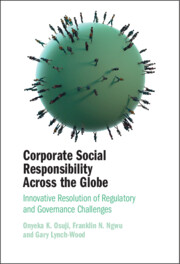 Corporate Social Responsibility Across the Globe
Corporate Social Responsibility Across the Globe Book contents
- Corporate Social Responsibility Across the Globe
- Corporate Social Responsibility Across the Globe
- Copyright page
- Epigraph
- Contents
- Figures
- Table of Cases
- Table of Legislation
- 1 Introduction: The Centrality of Regulation in Corporate Responsibility
- Part I Regulation Concepts, Paradigms and Approaches for Corporate Social Responsibility
- 2 The Values System Paradigm As a Regulatory Alternative to Stakeholder Needs CSR
- 3 Incentives, Public Procurement and Market Mechanisms
- 4 Governance of Firms, Poverty and Shared Responsibilities for Human Rights in UNGPs: Smart-Mix Regulation and CSR within Coalitions of the (Un)Willing
- Part II Infusing Corporate Social Responsibility in Corporate Governance
- Part III Stimulating Private Regulation of Corporate Social Responsibility
- References
3 - Incentives, Public Procurement and Market Mechanisms
from Part I - Regulation Concepts, Paradigms and Approaches for Corporate Social Responsibility
Published online by Cambridge University Press: 15 June 2023
- Corporate Social Responsibility Across the Globe
- Corporate Social Responsibility Across the Globe
- Copyright page
- Epigraph
- Contents
- Figures
- Table of Cases
- Table of Legislation
- 1 Introduction: The Centrality of Regulation in Corporate Responsibility
- Part I Regulation Concepts, Paradigms and Approaches for Corporate Social Responsibility
- 2 The Values System Paradigm As a Regulatory Alternative to Stakeholder Needs CSR
- 3 Incentives, Public Procurement and Market Mechanisms
- 4 Governance of Firms, Poverty and Shared Responsibilities for Human Rights in UNGPs: Smart-Mix Regulation and CSR within Coalitions of the (Un)Willing
- Part II Infusing Corporate Social Responsibility in Corporate Governance
- Part III Stimulating Private Regulation of Corporate Social Responsibility
- References
Summary
The chapter considers the concept of regulation and a range of regulatory and non-regulatory options, including market and non-market mechanisms that governments have used and can use to advance corporate social responsibility (CSR). It recommends a six-step model for developing a CSR policy framework for governments of developing and emerging countries. The chapter therefore reiterates a more nuanced approach to regulation of CSR than the voluntarism orthodoxy acknowledges.
Keywords
- Type
- Chapter
- Information
- Corporate Social Responsibility Across the GlobeInnovative Resolution of Regulatory and Governance Challenges, pp. 39 - 64Publisher: Cambridge University PressPrint publication year: 2023
